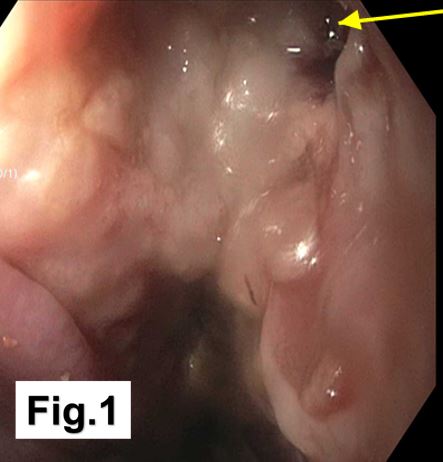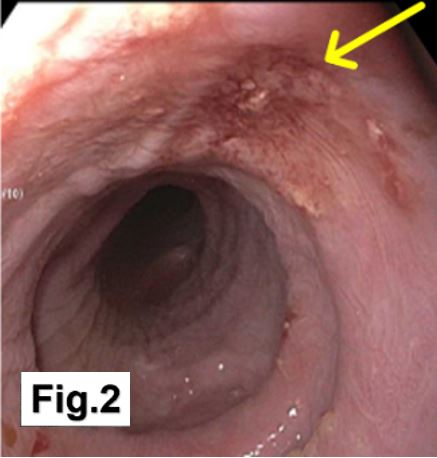Monday Poster Session
Category: Esophagus
P2837 - Endoscopic Management of Esophageal Perforation due to Denture Ingestion
Monday, October 27, 2025
10:30 AM - 4:00 PM PDT
Location: Exhibit Hall
- SP
Sheila Patel, BS
TMC
Denison, TX
Presenting Author(s)
Sheila Patel, BS, Joshua Varghese, BS, Jefferson Tran, , Nhat Nguyen, MD, Thomas Tran, MD
TMC, Denison, TX
Introduction: Denture ingestion is often accidental in the elderly population. Most cases result in spontaneous passage, but 20% lead to severe complications such as necrosis, perforation, and obstruction of the GI tract. We report a case of esophageal perforation due to denture ingestion that was successfully treated by endoscopy.
Case Description/
Methods: The patient is a 79-year-old woman with a history of hypertension, aortic stenosis status post transcatheter aortic valve replacement, and T3N0 colon cancer status post partial colectomy. She presented with accidental swallowing of her denture 10 days prior to admission. Her symptoms included dysphagia to solids and liquids, nausea, and epigastric pain. Lab works were significant for leukocytosis at 10.34. CT scan showed a small amount of mediastinal air at the T10 level. Emergent EGD showed a 2.5 cm denture in the middle third of the esophagus 30 cm from the incisors. The denture was indented into the esophagus. Removal was accomplished with a grasping device slowly teasing it off the wall and then slowly pulling it out through the mouth. Three cratered esophageal ulcers were found 27 to 30 cm from the incisors. The largest lesion was 15 mm consistent with an esophageal perforation (Fig. 1). A 23 mm x 15.5 cm covered stent under fluoroscopic guidance was placed to cover the perforation. The patient did well post EGD. She tolerated a soft diet the next day and was discharged. Five weeks later, a repeat EGD revealed an esophageal stent in the esophagus. Removal was accomplished with a grasping device. Several superficial esophageal erosions were found in the upper and middle thirds of the esophagus. The perforation had completely resolved (Fig. 2). The patient has done well since with no GI symptoms.
Discussion: Foreign body ingestion is a common problem in children and elderly individuals. Accidental ingestion of dentures accounts for 3.1% of esophageal foreign bodies. Denture ingestion can result in esophageal perforation, a condition which is fatal in 10-25% of cases if therapy is initiated within 24 hours and 40-60% of cases if treatment is delayed. Treatment options for esophageal perforation include esophageal stenting, thoracoscopic and open surgical repair. This case report demonstrates that endoscopic removal followed by esophageal stenting is a safe and effective treatment option for esophageal perforation due to denture ingestion.

Figure: Esophageal perforation due to denture ingestion (arrow)

Figure: Resolution of esophageal perforation after esophageal stenting (arrow)
Disclosures:
Sheila Patel indicated no relevant financial relationships.
Joshua Varghese indicated no relevant financial relationships.
Jefferson Tran indicated no relevant financial relationships.
Nhat Nguyen indicated no relevant financial relationships.
Thomas Tran indicated no relevant financial relationships.
Sheila Patel, BS, Joshua Varghese, BS, Jefferson Tran, , Nhat Nguyen, MD, Thomas Tran, MD. P2837 - Endoscopic Management of Esophageal Perforation due to Denture Ingestion, ACG 2025 Annual Scientific Meeting Abstracts. Phoenix, AZ: American College of Gastroenterology.
TMC, Denison, TX
Introduction: Denture ingestion is often accidental in the elderly population. Most cases result in spontaneous passage, but 20% lead to severe complications such as necrosis, perforation, and obstruction of the GI tract. We report a case of esophageal perforation due to denture ingestion that was successfully treated by endoscopy.
Case Description/
Methods: The patient is a 79-year-old woman with a history of hypertension, aortic stenosis status post transcatheter aortic valve replacement, and T3N0 colon cancer status post partial colectomy. She presented with accidental swallowing of her denture 10 days prior to admission. Her symptoms included dysphagia to solids and liquids, nausea, and epigastric pain. Lab works were significant for leukocytosis at 10.34. CT scan showed a small amount of mediastinal air at the T10 level. Emergent EGD showed a 2.5 cm denture in the middle third of the esophagus 30 cm from the incisors. The denture was indented into the esophagus. Removal was accomplished with a grasping device slowly teasing it off the wall and then slowly pulling it out through the mouth. Three cratered esophageal ulcers were found 27 to 30 cm from the incisors. The largest lesion was 15 mm consistent with an esophageal perforation (Fig. 1). A 23 mm x 15.5 cm covered stent under fluoroscopic guidance was placed to cover the perforation. The patient did well post EGD. She tolerated a soft diet the next day and was discharged. Five weeks later, a repeat EGD revealed an esophageal stent in the esophagus. Removal was accomplished with a grasping device. Several superficial esophageal erosions were found in the upper and middle thirds of the esophagus. The perforation had completely resolved (Fig. 2). The patient has done well since with no GI symptoms.
Discussion: Foreign body ingestion is a common problem in children and elderly individuals. Accidental ingestion of dentures accounts for 3.1% of esophageal foreign bodies. Denture ingestion can result in esophageal perforation, a condition which is fatal in 10-25% of cases if therapy is initiated within 24 hours and 40-60% of cases if treatment is delayed. Treatment options for esophageal perforation include esophageal stenting, thoracoscopic and open surgical repair. This case report demonstrates that endoscopic removal followed by esophageal stenting is a safe and effective treatment option for esophageal perforation due to denture ingestion.

Figure: Esophageal perforation due to denture ingestion (arrow)

Figure: Resolution of esophageal perforation after esophageal stenting (arrow)
Disclosures:
Sheila Patel indicated no relevant financial relationships.
Joshua Varghese indicated no relevant financial relationships.
Jefferson Tran indicated no relevant financial relationships.
Nhat Nguyen indicated no relevant financial relationships.
Thomas Tran indicated no relevant financial relationships.
Sheila Patel, BS, Joshua Varghese, BS, Jefferson Tran, , Nhat Nguyen, MD, Thomas Tran, MD. P2837 - Endoscopic Management of Esophageal Perforation due to Denture Ingestion, ACG 2025 Annual Scientific Meeting Abstracts. Phoenix, AZ: American College of Gastroenterology.
